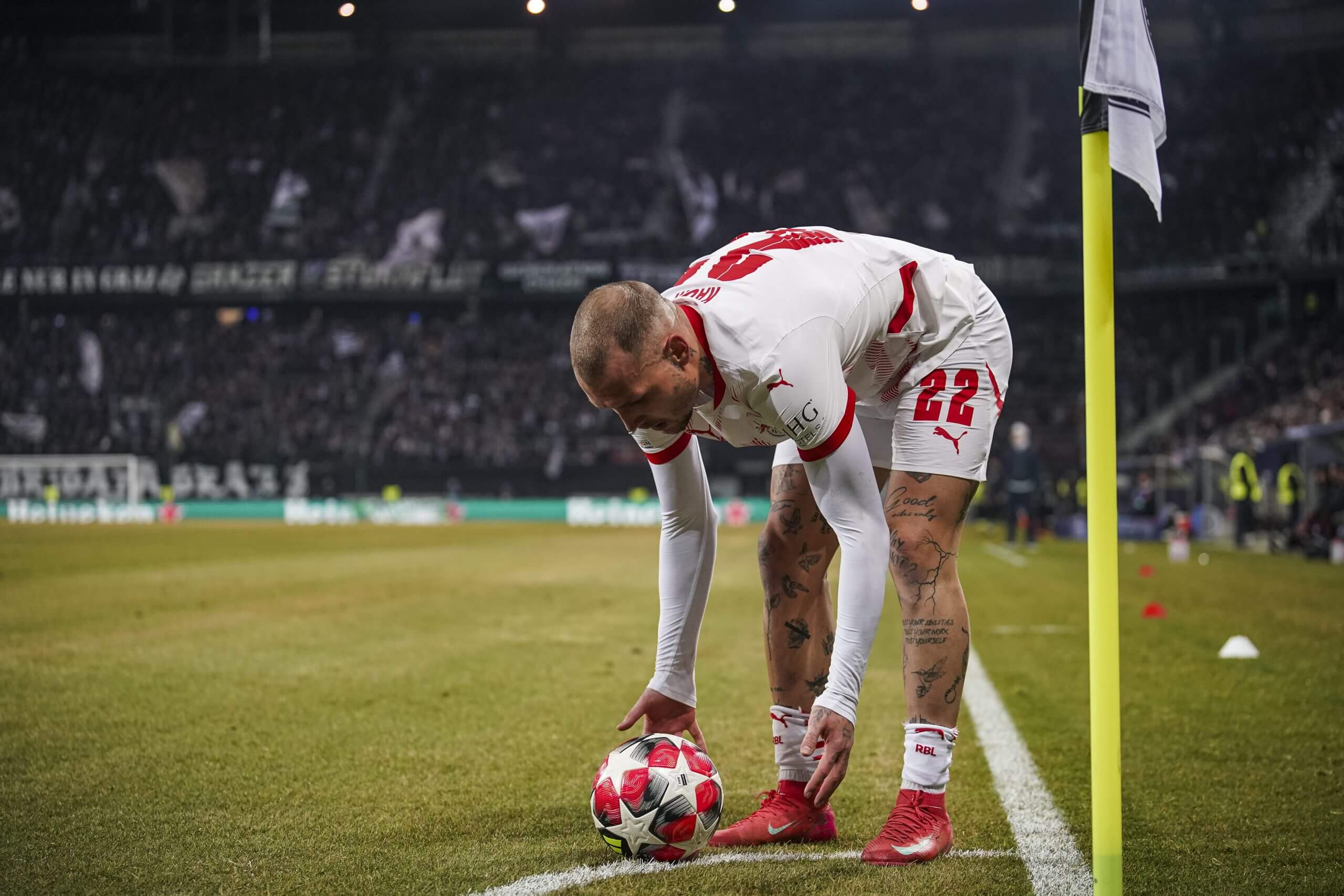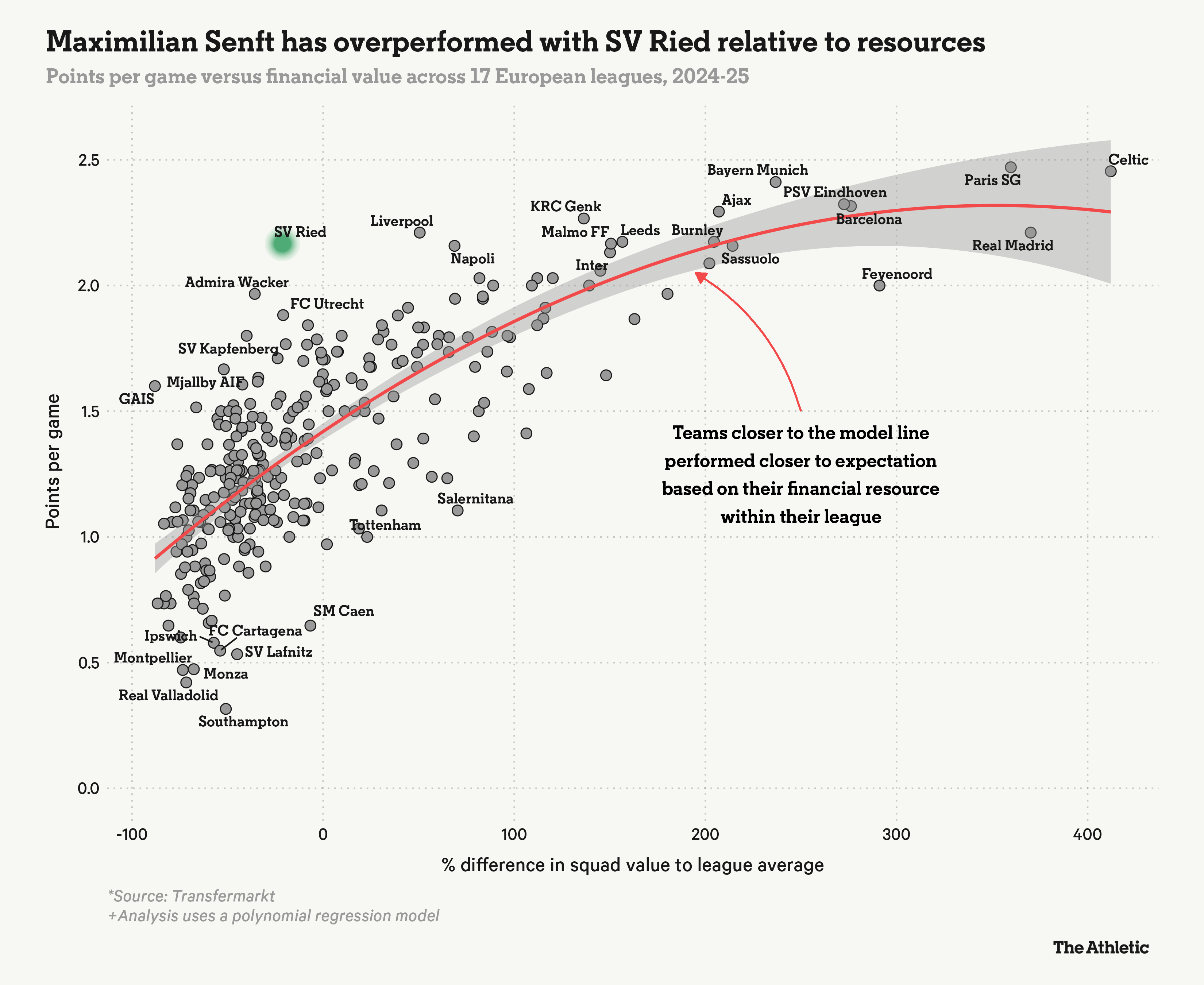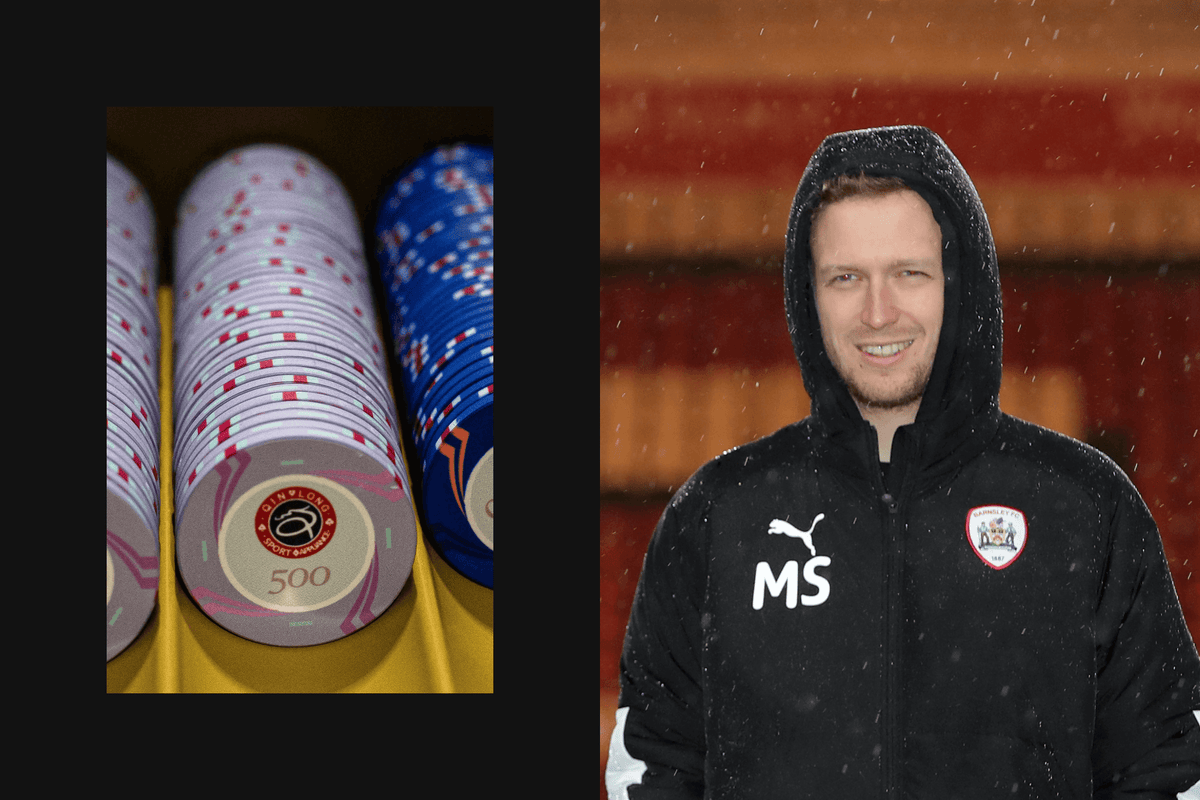Few managers have greater mental clarity than Maximilian Senft.
“The result has elements of truth, but only elements — the result is not the truth. What I have learned in poker is not to let your emotions from a result influence your decisions too much.”
A new season is underway for the 35-year-old, who led his SV Ried side to promotion to the Austrian Bundesliga last season — starting the campaign with a 2-2 draw with juggernauts Red Bull Salzburg last weekend. Senft has earned the right to flex his coaching muscles in his nation’s top division, but his pathway into management is unquestionably unique.
Senft grew up playing amateur football in the lower leagues of Austria, but the opportunity to play professionally was never truly on the cards. Instead, he earned a degree in economics at Vienna University of Economics and Business before pursuing a passion for poker, travelling the world to compete in tournaments as a full-time professional. His best finish was 11th place among nearly 7,000 contenders in the 2014 World Series of Poker held in Las Vegas, winning approximately $500,000 in prize money.

(Franz Kirchmayr/SEPA.Media/Getty Images)
It was only in his mid-twenties that Senft saw football coaching as a viable career option, enrolling in coaching courses, earning a Master’s degree in training and sport at the University of Applied Sciences Wiener Neustadt, and networking with fellow tactical minds who were contributing to the highly-regarded analysis website Spielverlagerung.
Double roles as an assistant coach and analyst in the lower leagues of Austrian football led Senft to a position at top-flight club Austria Vienna before becoming assistant coach to Gerhard Struber — now head coach at Bristol City in the English Championship — at Wolfsberger AC and Barnsley.
Barely five years after that stint in England, Senft has returned to the top table of Austrian football as a key man in the dugout, having been promoted to SV Ried’s first-team head coach in March 2023.
While his focus is now football, the skills he developed from a previous life are just as relevant.
“I would say that poker and football are both games of incomplete information,” Senft tells The Athletic.
“You don’t know what will happen in the next minutes, and you don’t know what kind of cards your opponent holds — that’s the same in football. It’s so important to be able to adapt to the opponent, and this is the process that never stops over the 90 minutes.
“I would hope that I’m a bit more cool with my decisions, because I’ve learned to value all the factors that go into a decision.”

Senft’s unusual career includes a spell with Barnsley (Ben Roberts Photo/Getty Images)
Senft has developed a clear strategy on how he wants his team to play. Much like adapting to the cards he has been dealt, he and his colleagues have formed a blueprint that can be adjusted depending on the qualities of his squad.
“We have a concept at the club that gives us a ‘logic’ about how we speak and think about football,” Senft says. “Within that, every coach can take their interpretation of that logic.
“If I know my goalkeeper is very good at hitting long balls, how can I integrate his long balls into our idea? If I have a player who can dribble, we need to use this in our game model. Our logic will be interpreted in a way that fits the strengths of the players.”
Typically setting up in a 3-4-3 or 3-5-2, Senft speaks of different priorities that his team has — from rhythm to manipulation to overloads, all with a view to playing aggressive, intelligent football.
Set pieces are a key part of that, with Senft’s time in England teaching him the value of training such a crucial phase of the game. SV Ried dedicate one day per week exclusively to set pieces, and the return on investment has been stark. According to Impect’s data, Senft’s side were one of the strongest dead-ball specialists across all European leagues last season, registering an xG difference of 0.39 per game in the set-piece phase. Put simply, they created chances of notably higher quality that they conceded within these situations across the season.

(Christian Hofer/Getty Images)
The emotional ebb and flow of modern football will persist, but Senft’s resolve to commit to his tactical decisions is not to be underestimated.
“If I think my decision is the best, I will go with it — then sometimes you are the hero and sometimes you are the guy who does not understand football at all and should not be the coach,” Senft says.
“But in the end, judgement from the public or the media should not influence your decision because most of the time (their opinion) will simply depend on the result — but football is so complex. For example, one substitution cannot be too influential on the result because there are so many other factors at play.”
As Ian Graham, Liverpool’s former director of research, recently told The Athletic, contrarianism to conventional, risk-averse approaches can itself be a productive approach.
By the same token, sticking to your guns can be a valuable method to cut through the outside noise.
Senft should be validated in standing by the decisions he has made, with SV Ried — the club that Crystal Palace manager Oliver Glasner spent the vast majority of his playing career — winning the 2 Liga (Austria’s second division) by six points last season, with a +36 goal difference being more than double their nearest rivals (Flyeralarm Admira, on +17).
Whichever way you look at it, Senft’s coaching has been successful in eking out as much quality as he can within his squad, with numbers that stack up favourably in Austria and wider Europe in 2024-25.
One easy analysis can map a team’s points per game compared with their squad’s value, relative to the league average. When doing so across Europe’s wider leagues, Senft’s side pop out as a notable statistical outlier.
Simply, SV Ried overperformed more than any side in the dataset in their promotion-clinching season under Senft based on their squad value within their respective division.

Despite the numbers underpinning Senft’s performance as a coach, he was quick to highlight the degree of control he can have over his team’s performance on a matchday.
“Football is a player’s game,” Senft said. “Everyone agrees on that, but the balance changes throughout the game. I am convinced that the influence of a coach and the tactics we have trained is much bigger in the opening 20 minutes of each half than it becomes at the end of a half.
“Throughout the week, it is the coach’s job to prepare the team for those moments where it’s much more up to them — at the end of a game, this is even more important.”
Developing such a dead-eyed tactical approach has been a favourable attribute from Senft’s previous career, but injecting emotion into his players is crucial as a head coach.
“When you want to deliver your message to the players, this is the point where you need all the emotions and you need the relationships with the players so they trust you and believe in your ideas,” Senft says.
“Without relationships and emotions, this does not work. In poker, I don’t have to convince anyone — I can play for myself. But as a head coach, you want to convince your team, the board, and the fans — and there, the element of emotion and relationships is so crucial.”
How emotion and strategy are interconnected is where things get particularly interesting, with Senft using specific ‘anchors’ for players to use as reference points when things get tough during a game — for example, receiving a red card or being a goal behind.
“We have an emotional framework and anchors of what to do in certain situations, and how we interact, but we have certain tactics that we can use when the pressure is bigger and when the risk aversion is higher — because usually your precise coordination goes down in these moments,” Senft explains.
“It’s not always the emotions that influence tactics. Through a clear plan, you can improve emotional control because you know you can carry out certain actions. For example, it doesn’t matter how angry or sad I am, I can execute this strategy. This is what we prepare theoretically and on the training pitch.”
When the chips are down, having unwavering game plans can be crucial in moments of indecision, chaos, or struggle.
For Senft, possessing such a strategic mentality is proving lucrative in football management.
(Top photo: Getty Images)

